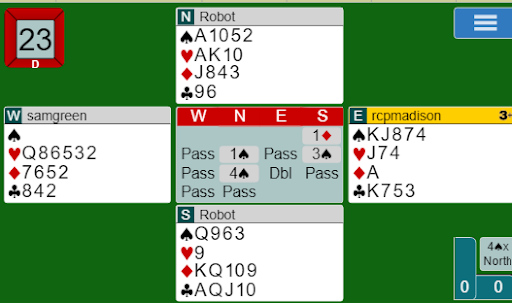Question: Is there any rule when to invoke a penalty double? The Robots made this bid with the penalty double.Mark:
I mean this very seriously.
There's an old saying that I
think is valid. If you don't double some contracts that turn out to be cold,
you are not doubling enough.
Many terrible results are due to a failure to
double when there is no certainty of setting the contract. In a duplicate game,
the auction makes it sound like the same contract will be reached everywhere
and the East hand will often double. If everyone in 4S goes down, which is more
likely than not, then everyone who fails to double will get a bad score,
assuming the same tricks are won and lost at most tables. Even in a team game I
would double with the East hand. As long as there are no overtricks, the IMP
loss for doubling a cold game is surprisingly small, typically 5 IMPs. You gain
a lot if you set the contract 2 or 3 tricks. Moreover, you have an intangible
gain as your opponents avoid bold bidding against you in the future. Only at
rubber bridge would I not double 4 spades on the bidding shown. That's because
of the chance that the double could help declarer find an unlikely line of play
to make a game that would be defeated without the warning.
Knowing that the
opponents are facing a 5-0 trump break, a fact they couldn't have known when
they bid game, makes it likely that they will take a couple fewer tricks than
they expected.
This hand was unlucky for East. South bid very aggressively with
3 Spades. I'm surprised that North, with significantly more than he might have
had to bid 4 didn't make a slight move toward a possible slam by cue- bidding 4
hearts. South would have declined, of course, having less, rather than more, than
a minimum for the 3 S bid, but E could be dissuaded from doubling, knowing that
N had some thoughts of slam.
In a game with human opponents at an actual table,
I'd think about whether there had been unintended but inappropriate information
that kept N from bidding more actively. For instance, suppose South fingered
the 2 spade bid before pulling out the 3S card, I would call the director.
If I
were the director with those hypothetical facts established, I'd award an
adjusted score of 4 spades un- doubled. I think 4 spades will make most of the
time, even without the warning double. If there's a likely play that would lead
to going down absent the double, I'd award an un- doubled set to the defenders,
provided they didn't defend carelessly.






